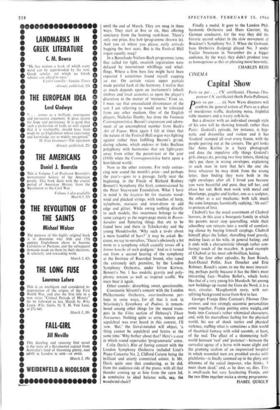CINEMA
Capital Show
Paris vu par . . . ('X' certificate). Thomas l'Im- posteur (`A' certificate) (both Paris-Pullman).
?Cris vu par . . . six New Wave directors will onfirm the general notion of Paris as a place of murderous traffic, deafening noise, frightful table manners and a weary ooh-la-la.
Bufra director with an individual enough style of his own will be showing himself, rather than Paris: Godard's episode, for instance, is hyp- notic and dreamlike and violent and it has `Godard' stamped all over every frame, with the people peering out at the corners. The girl looks like Anna Karina in a fuzzy photograph and does the impulsive silly things Godard's girls always do, posting two love letters, thinking she's put them in wrong envelopes, explaining to each man in turn that he's the one she loves whatever he may think from the wrong letter, then finding they were both in the right envelopes after all. I loved you because you were beautiful and pure, they tell her, and chase her out. Both men work with metal and blowlamps, goggles and leather, one as a sculptor, the other as a car mechanic; both talk much the same language, laconically replying, `Ah oui?' to protests of love.
Chabrol's has the usual assortment of Chabrol horrors, in this case a bourgeois family in which the parents never stop quarrelling, while their schoolboy son retreats into a world of comfort- ing silence by buying himself earplugs. Chabrol himself plays the father, shovelling food grossly, making faces at his wife, in general hating; and it ends with a characteristic (though rather con- fusing) touch of the macabre. A good example of Chabrol at his most sub-Swiftian, hating.
Of the four other episodes, by Jean Rouch, Jean-Daniel Pollet, Jean Douchet and Eric Rohmer, Rouch's seems to me the most interest- ing, perhaps partly because it has the film's most interesting face—Nadine Ballot's, which looks like that of a very young Iris Murdoch. Set among new buildings up round the Gare du Nord, it is a neat, circular, Maughamish story, with ear- splitting background noise from first to last.
Georges Franju films Cocteau's Thomas rim- posteur, and two strongly eccentric personalities come together, Franju putting extra weight, and body into Cocteau's rather whimsical characters, and, with his marvellous feeling for the physical world, his use of shock tactics and physical violence, stuffing what is sometimes a thin world of theatrical fantasy with solid seconds, at least, of the real. The effect of a shimmering half- world between 'real' and 'pretence'—between the surrealist agony of a horse with mane alight and the grunting realism of an improvised hospital in which wounded men are prodded awake with pitchforks—is finally summed up in the glory and dilemma of the social imposter, who thinks, 'I must sham dead,' and, as he does so, dies. This is small-scale but very fascinating Franju, and the two films together make a strong programme.
ISABEL QUIGLY


































 Previous page
Previous page